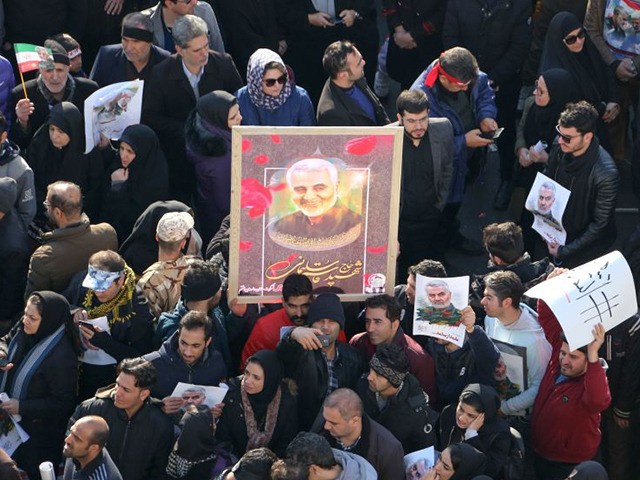Iranian Islamic Revolutionary Guard Corps (IRGC) commander Abdullah Agrahi on Thursday vowed to take “harsher revenge” against American targets for the liquidation of IRGC Gen. Qasem Soleimani by a U.S. airstrike.
Agrahi, like many other Iranian officials, evidently saw Tuesday night’s zero-casualty Iranian missile attack on Iraqi bases as insufficient, or as merely a taste of greater retaliation to come.
According to Iranian reports translated by the Kurdish news service Rudaw, Agrahi declared his IRGC is the “strong arm of the Supreme Leader,” meaning Ayatollah Ali Khamenei. He hailed Soleimani as one of the IRGC’s best commanders and said the entire region was “under his control” until the U.S. eliminated him.
“The regime will impose a more severe revenge on the enemy in the near future,” Agrahi promised.
Ayatollah Khamenei got into the game by claiming the rocket attack was “merely a slap” and Iran’s true goal is ending the U.S. presence in the Middle East. He accompanied this with a propaganda photo of U.S. President Donald Trump with a red handprint across his face:
Ayatollah Khamenei says that the attack Iran launched was just a slap in the face and that the real retaliation is still to come. Posting a image on his website of a photoshopped picture of @realDonaldTrump with a slap mark across his face. pic.twitter.com/tdFaiHGoVa
— Ali Arouzi (@aliarouzi) January 9, 2020
IRGC aerospace commander Amirali Hajizadeh sounded a similar note in a press conference on Thursday, portraying Tuesday’s missile attack as just “the start of a major operation that will continue throughout the region.”
Hajizadeh claimed Iran could have killed 500 Americans in its first attack and 4,000 or 5,000 more with follow-up strikes, but chose to be more merciful. He also repeated Iran’s claims that heavy casualties actually were inflicted by the Tuesday attack but the victims were secretly transferred to “Jordan, the Zionist regime, and also Baghdad” to hide them from reporters.
The Pentagon said on Wednesday that although no one was injured by the Iranian rocket attack, it was not for lack of trying.
“I believe based on what I saw and what I know is that they were intended to cause structural damage, destroy vehicles and equipment and aircraft, and to kill personnel,” Joint Chiefs of Staff Chairman Gen. Mark Milley said, pushing back against the notion that Iran’s missiles were intentionally harmless.
Milley credited early-warning systems and quick action by personnel at the targeted Iraqi bases with preventing casualties.
“In my estimation from what I know now, I think it has more to do with the defensive techniques that our forces used as opposed to intent,” he said.

COMMENTS
Please let us know if you're having issues with commenting.